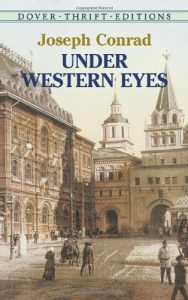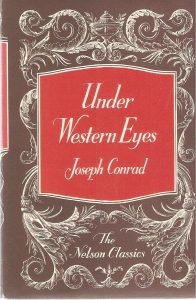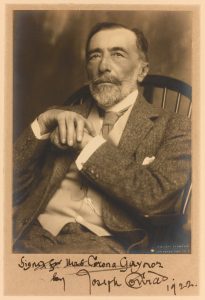Under Western Eyes – Joseph Conrad – 1911

Posted by Guillermo Maynez on 16/3/2013, 11:12:57
All of the works by Conrad that I’ve read are emotionally charged, not in a melodramatic way, but in a tense way. Tension, a repressed or barely contained desperation, seems to permeate all his books; the sense that something horrible is about to happen. And “Under Western Eyes” not only is not the exception, but takes that feeling to the limit, for this reason: it deeply touches his personal life and feelings. His parents basically died as a consequence of their active and revolutionary opposition to the Tsarist regime, and his life changed for ever. Instead of growing up within the minor Polish nobility of the Ukraine, he was orphaned and forced to become a sailor, first for the French and then for the British Navy. This also probably saved his life: in his old age, he would have been caught in the decadence and final chaos of the Tsars, WWI, and the Bolshevik Revolution.
Easily, he could have developed a Romanticized and Idealized sense of revolutionaries, but he was a man with much too clear a vision to fall into sentimental longings, plus he travelled the world and saw many things. Both here and in “The Secret Agent”, Conrad shows us revolutionaries and radicals for what they are, almost all of them: resentful, selfish, deluded maniacs who are full of hatred disguised as Idealism. Not that there is nothing to resent about political regimes: most of them are also headed by selfish, greedy, deluded and corrput people, who deserve being repelled.
The point is this: decent people who mind their own business and take care of themselves and their loved ones, usually get trapped in the struggle between lunatics with power and lunatics who want that same power. Kyrilo Sidorovitch Razumov is just such a man: an intellectual lad, lucid enough to avoid falling for theoretical fancies, but articulate enough to have his own political ideas and expressing them, which calls the attention of a typical radical: hysterical, violent, egocentric, and neurotic. (Have you noticed how frequently these guys are encouraged by loving mothers and sisters?). Victor Haldin seems to project into the person of Razumov (perhaps Sterling can correct this if I’m wrong) many of his illusions, and creates in his letters a character, the Razumov he believes must exist, which of course is far from the real man.
And with dictatorships (and a monarchy is a kind of dictatorship), the less they notice you, the better, for once you fall under their radar, they most likely won’t let you alone. And damn it, Razumov’s possibly brilliant future as an academic goes down the drains, thanks to the idealization Haldin makes of him.
I’ll stop here for now, but there’s much more to talk about, when the action moves to Geneva. For me, definitely the best and most interesting book of the year so far (and I’ve enjoyed “Doomsday Book” and “Njal’s Saga” very much), Conrad always gives a lot to think about.
~
Posted by Sterling on 18/3/2013, 20:20:00, in reply to “Under Western Eyes”
Very interesting post, Guillermo. I knew that Conrad was Polish, but I did not know all the rest of the history you provided, especially the link to Russia and to revolutionaries. Perhaps that is why Conrad developed the narrator as a full character. It allowed him to discuss revolutionaries through the filter of the doddering English fool, panting after poor Natalia. In this manner, the author could protect himself from exposing his own deeply conservative views. Further, it is by no means certain how reliable the narrator is, which throws a shadow of question over the entire novel.
You speak of Razumov with sympathy. Actually, I found him to be remarkable unlikeable — a selfish, self-invovled, self-pitying, obnoxious little prig. I thought it a measure of Conrad’s skill as a novelist that he could make me care what happened to Razumov.
I’ve been thinking about the title. Clearly, the “Western eyes” are those of the narrator. But in what sense is the action of the novel “under”? Before reading the novel, I had imagined “under” as in “under scrutiny,” observed. After readingf it, I’m inclined to think of “under” as “underground,” what takes place out of sight. Maybe I’m overthinking it, but it strikes me as clever that it can be read both ways.
PS – I agree that Haldin has employed projection in reading nobility into Razumov’s aloofness, where no nobility exists.

Posted by guillermo maynez on 19/3/2013, 19:56:27, in reply to “Re: Under Western Eyes”
More than liking or disliking Razumov for himself, my interpretation was that we will never be able to discover the real Razumov: his life was totally sent off course by Haldin’s extremely selfish action (involving an unwilling person in a political murder). Perhaps Razumov is selfish an unlikable; after all he has been abandoned by everyone, raised in loneliness, and has no one to care for him, small wonder he is bent on looking after himself. Yes, he is not one of the characters about whom one says: “I would have loved to have a drink with him”, but I guess most people would be very annoyed at having been involved in such schemes. It’s hard to say Razumov “betrayed” Haldin (they weren’t in any kind of accord), and in the end he sacrificed himself, even if he did it for Natalia (I wouldn’t have said no to a drink with her).
~
Posted by guillermo maynez on 26/3/2013, 14:19:06, in reply to “Re: Under Western Eyes”
The other characters in UWE are also very interesting. Peter Ivanovitch is the typical egomaniac usually involved in politics: he actively promotes a kind of cult of personality for himself, never practicing what he preaches (Feminism). One much-publicized heroic deed, his escape from Siberia, becomes a mantle which covers everything he does afterwards, whatever its merits.
Sophia Antonovna is more complex, an intellectual woman actively involved in politics, acting as godmother for younger proteges (willing or unwilling).
Tekla is the naive person who, in good faith, sacrifices herself for others, adhering to ideologies of questionable value based on her unfortunate story.
What do you think of these characters and others that appear in the novel?
~
Posted by Steven on 27/3/2013, 17:44:30, in reply to “Re: Under Western Eyes”
I finished UWE more than a week ago, but since I had surgery I’ve been limited in being able to sit at the computer. All of the comments posted so far are very fine.
What struck me immediately about the dialogue in the novel is that it sounds Russian–the kind of confused candor and rushed, interrupted sentences you find in Dostoevsky.
Yet Conrad is said to have hated Dostoevsky and Crime and Punishment in particular, though the source (Wikipedia, probably), didn’t elaborate. Razumov is no cold-blooded murderer, but he does sound a little bit like Raskolnikov addressing Sonya when he says to Natalia near the end of the book: “Yes, I am washed clean.” And later after a long confessional passage: “you have freed me from the blindness of anger and hate–the truth shining in you drew the truth out of me. Now I have done it; and as I write here, I am in the depths of anguish, but there is air to breathe at last–air!”
Another thing that caught my eye was the statement by the narrator early in the book: “What must remain striking to a teacher of languages is the Russians’ extraordinary love of words,” coming just a page or two after he said “Words, as is well known, are the great foes of reality.”
And here’s a quote I had marked that perfectly supports something Guillermo said:
“The last thing I want to tell you is this: in a real revolution— not a simple dynastic change or a mere reform of institutions— in a real revolution the best characters do not come to the front. A violent revolution falls into the hands of narrow-minded fanatics and of tyrannical hypocrites at first. Afterwards comes the turn of all the pretentious intellectual failures of the time. Such are the chiefs and the leaders.”
~
Posted by Sterling on 27/3/2013, 20:15:50, in reply to “Re: Under Western Eyes”
: “The last thing I want to tell you is this: in a
: real revolution— not a simple dynastic change or a
: mere reform of institutions— in a real revolution the
: best characters do not come to the front. A violent
: revolution falls into the hands of narrow-minded
: fanatics and of tyrannical hypocrites at first.
: Afterwards comes the turn of all the pretentious
: intellectual failures of the time. Such are the chiefs
: and the leaders.”
Yes, well, Guillermo’s descriptions of Conrad’s childhood might explain his extreme conservatism. I’m afraid I can’t agree. Yes, sometimes the “narrow-minded fanatics” seize control of a revolution, but I don’t think that accounts for, say, Benjamin Franklin. Nothing is ever that simple or clear-cut. There are at least as many individuals of noble or idealistic character among revolutionaries as exist within the regime to be overthrown. Even Conrad illustrated that with his unflattering portrayals of Prince K– and General T–. And Councillor Mikulin is positively chilling.

Posted by Guillermo Maynez on 28/3/2013, 12:21:02, in reply to “Re: Under Western Eyes”
Of course there are idealistic, honest, and noble-minded individuals among revolutionaries, and indeed among people who oppose any political regime. And, undoubtedly, authoritarian regimes are by nature operated by corrupt, despotic persons. I never said the contrary. But it is true that, once revolutions are set in motion, the most ruthless and selfish individuals tend to take control of them (and usually perish in the process). Precisely, the point I tried to make in my initial comments was that Razumov sees himself trapped between two sets of selfish, corrupt people. The Czarist regime was hateful surely, unmindful of the poverty and oppression suffered by the people, as much as the French regime of the Louises was also oblivious to hunger and corruption. They were thrown away in bloody revolutions: in France, they cut a king’s head to install an Emperor (Napoleon, an ambitious individual if there ever has been one), and the Russians ended up with Vladimir Putin instead, after Lenin, Stalin, Khruschev, etc. One could make a point about successful politicans being mostly (not all) ruthless, corrupt guys.
Now, the American Revolution is a singular one. Certainly, the British rule was far from the despotism and corruption associated with most other regimes overthrown by revolutions. The American colonies simply had matured and were ready for self-rule. The US was lucky to have an exceptional generation of enlightened (if contradictory) individuals, but that does not apply to most other political revolutions.
~
Posted by Sterling on 28/3/2013, 16:07:18, in reply to “Re: Under Western Eyes”
Indeed, it is a sad thing that, for the most part, the individuals that you might wish to govern are not interested in being politicians.
And I certainly agree that revolution did not work out very well for France or Russia. Perhaps a case may be made for a few revolutionaries, e.g., Danton or Trotsky, but for the most part they seem to have been narrow-minded fanatics, blood-thirsty murderers, power-hungry dictators, or some ungodly combination of the three.
~
Posted by guillermo maynez on 1/4/2013, 17:08:48, in reply to “Re: Under Western Eyes”
I hadn’t thought abut the title and its meaning until Sterling pointed out the ambivalence of it. “Under” seems to mean both “within the scrutiny” of Western mind, in this case represented by the narrator, and “out of sight” of the Western society, epitomized by the Swiss, a Western society if there is any worthy of that title. Conrad’s narrative technique is a touch of genius: it allows him, the author, to expose his estrangement, bewilderment, and at the same time his attraction towards that passionate, mystical, so un-British conception of politics and society.
I don’t know about you, but for me the Russians, as portrayed by their literature and the literature about them, are very strange people, repulsive and lovable; irrational and profound; crazy yet sane in some mysterious way. I have always found something very similar, disturbingly similar, between the Russian and Mexican mentalities, and what astonishes me about them is very close to what astonishes me about my fellow Mexicans, at their most Mexican.
~
Posted by Sterling on 2/4/2013, 13:02:15, in reply to “Re: Under Western Eyes”
That’s fascinating, Guillermo. I’m ashamed to say that I know far too little of our neighbours to the South to comment on the Mexican national character, but it is extremely interesting to me that you believe it resembles the Russian character.
I share your sense of the Russian character from literature. Conrad’s Russians remind one of Dostoevsky (even if Conrad did dislike his work). Dostoevsky is quite extreme, of course, but even in milder writer, e.g., Tolstoy or Turgenev, there remains that feeling of extremes and contradictions.
